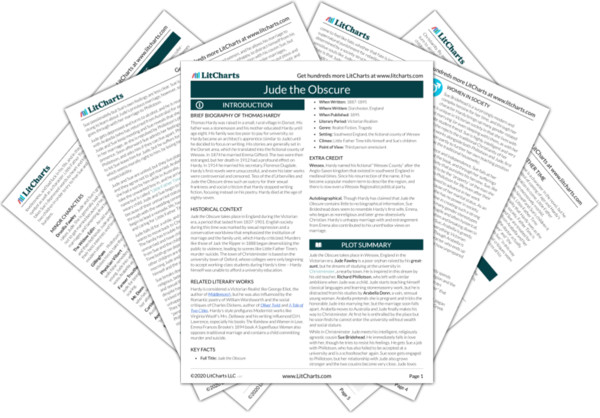Christminster is a fictional university town based on Oxford, England. Jude first learns of it when he is eleven years old and his teacher, Mr. Phillotson, leaves Marygreen to go there. Christminster then becomes the young Jude’s goal in life, and he idealizes the place as “The New Jerusalem” and a “city of light,” watching its faint, distant glow from the roof of the Brown House. When Jude finally makes it to Christminster, he imagines the shades of dead philosophers speaking to him in the streets. In the first part of the novel Christminster symbolizes Jude’s hope and idealism, and his desire to make a better life for himself despite his low social class.
The reality of Christminster soon strikes Jude (and the reader), however, as he learns that despite his hard work and natural intelligence, the colleges are only open to the upper classes. Phillotson, his predecessor, has also failed and settled back into his earlier role as a schoolmaster, and Jude likewise remains a stonemason. In this way Christminster comes to symbolize Jude’s failed hopes and dreams, and Hardy’s pessimistic worldview. After years of moving about nomadically, Jude returns to Christminster for one last attempt to achieve his goals. It takes him a long time to realize it, but he finally gives up Christminster as a hopeless dream. He recognizes that it would take “two or three generations” to do what he tried to do in one generation – raise his social class through his own hard work and intelligence. Because of the tragedy of Jude’s situation, Christminster ultimately becomes one of Hardy’s greatest critiques of the unfairness inherent in his society.
Christminster Quotes in Jude the Obscure
As the halo had been to his eyes when gazing at it a quarter of an hour earlier, so was the spot mentally to him as he pursued his dark way.
“It is a city of light,” he said to himself.
“The tree of knowledge grows there,” he added a few steps further on.
“It is a place that teachers of men spring from, and go to.”
“It is what you may call a castle, manned by scholarship and religion.”
After this figure he was silent for a long while, till he added,
“It would just suit me.”
Only a wall divided him from those happy young contemporaries of his with whom he shared a common mental life; men who had nothing to do from morning till night but to read, mark, learn, and inwardly digest. Only a wall – but what a wall!
You prove it in your own person. You are one of the very men Christminster was intended for when the colleges were founded; a man with a passion for learning, but no money, or opportunities, or friends. But you were elbowed off the pavement by the millionaires’ sons.
I feel that we have returned to Greek joyousness, and have blinded ourselves to sickness and sorrow, and have forgotten what twenty-five centuries have taught the race since their time, as one of your Christminster luminaries says…
“It would almost be better to be out o’ the world than in it, wouldn’t it?”
“It would almost, dear.”
“’Tis because of us children, too, isn’t it, that you can’t get a good lodging.”
“Well – people do object to children sometimes.”
“Then if children make so much trouble, why do people have ‘em?”
“O – because it is a law of nature.”
“But we don’t ask to be born?”
“No indeed.”
“And what makes it worse with me is that you are not my real mother, and you needn’t have had me unless you liked. I oughtn’t to have come to ‘ee – that’s the real truth! I troubled ‘em in Australia; and I trouble folk here. I wish I hadn’t been born!”












